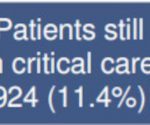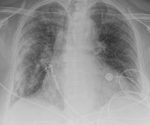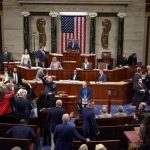The coronavirus police state: when suspected of infectiousness by police
Given that SARS-COV-2 related deaths appear to involve the expiration of the seriously ill who coincidentally may (or may not) be infected with a coronavirus (please see umpteen previous FBEL articles), it is a mystery why the UK Government would get so upset that some healthy people ventured outside to exercise this Sunday just gone. They didn’t, after all, include in their itinerary a diversion to a local intensive care unit, or a palliative hospice to spit or otherwise deposit bodily excreta on any patient there, and so wouldn’t have caused anyone to die by introducing a coronavirus, a virus, a bacteria nor even a fungus. The only explanation for the very overt Government anger that occurred on the following Monday is that the demonstration of health and vitality ruins the propaganda and the carefully constructed sense of emergency. Indeed, the Government is so upset that Boris Johnson has now announced fines for being outside for a reason not specified with his announcement (there are five).
At the time of writing the police do not know how they will enforce these fines – after all, the powers do not appear to be in the Coronavirus Bill. However, this information will be conveyed at this place when it has become known. In the meantime, as a matter of priority and so as to allay (with the facts that are known) some anxiety that people are bound to be feeling, we commence this series examining the rise of the coronavirus police state in Part 2 of Schedule 20 of the Bill, which covers “powers relating to potentially infectious persons in England”, and presents a number of ideas about what a “suspect” might expect to be required of an enforcing officer in the prosecution of the powers.
First it needs to be pointed out that the powers discussed here (and in forthcoming articles) come into effect on the declaration of a risk of coronavirus in England (and presumably Wales† – we’re not covering Scotland [not least immediately], to which a variation of the same rules apply) by the Secretary of State, and continue to apply until the declaration is revoked. This declaration is currently in force.
There are three types of official who can be vested with most of the powers discussed in this article, and these are a public health officer (for our purposes, “a registered public health consultant”), a customs officer, and a police constable. For the purposes of this article, we are only interested in looking at the powers available to the police (and remember, the jurisdiction is England and Wales), and so the legislation quoted here will omit clauses that are deemed irrelevant for purpose. In any case, the reader is urged to consult the legislation himself for full details so that he is not solely reliant on this article for his information and his own interpretation of the data.
There are two course of action available to a constable if he “has reasonable grounds to suspect that a person in England is potentially infectious” [7(1)], which is (for our purposes) defined in Part 1 of the same schedule as “is, or may be, infected or contaminated with coronavirus, and there is a risk that the person might infect or contaminate others with coronavirus”.
The two courses of action are “direct[ing] the person to go immediately to a place… which is suitable for screening and assessment” [7(2)(a)], or “remov[ing] the person to a place suitable for screening and assessment.” [7(2)(b)].
However, things are not as simple as all that. Before exercising these powers, the constable must “consult a public health officer to the extent that it is practicable to do so.” [7(5)]. Moreover, the constable…
may exercise the powers… in relation to a person only if the… constable considers that it is necessary and proportionate to do so—
(a) in the interests of the person,
(b) for the protection of other people, or
(c) for the maintenance of public health.
[7(3)]
There’s one more clause to reveal before discussing these powers; it is [7(4)], which covers how, where a constable issues a direction or removes a person, he must inform the person of the reason he is exercising the power (and also to detail related offences, but that will be covered in another article).
It is when the constable is carrying out the duty detailed in clause 7(4) where a person being suspected, or being appraised (if we can put it like that), might like to hear justification for the constable’s judgement. If the person is exhibiting no symptoms, and has not admitted an illness, the constable should perhaps explain how he has reasonable grounds to suspect infection. Remember, infection means that the coronavirus has replicated and is attacking the host, according to the orthodox medicine, and thus is producing symptoms of illness. Furthermore, without a test that can give an immediate result, the constable will have no way of determining contamination, which is the other definition of being contagious.
If the constable persists, the person might want to hear that the constable recognises that it is necessary to gain the opinion of a public health officer. The very fact that this is required in legislation suggests that the constable is not expected to be qualified to deduce infection from a person displaying no symptoms. If it is not practicable to gain this opinion, and the only way it is to be done is for the constable to remove the person, then the constable should ideally be explaining how it is he thinks that removal can only be performed after seeking the opinion of a public health officer, and not before (he shouldn’t be able to).
Moreover, if a public health officer has to be brought to the scene of the appraisal, the person might want to understand how being detained so that this can happen is proportional if there are no indications of illness, or whether indeed it is necessary if the person has no interest in receiving medical attention, and he is not known by the constable to be a risk to public health or a danger to other people. Likewise, if the constable decides that he will act without the public health officer’s advice (because gaining it is not practicable), the person might want to understand how it is that the officer is able to ascertain something that the legislation implies can only be gleaned by a public health officer.
Finally on this issue, if the constable acts to direct or remove the person, and has gained the opinion of a public health official to inform the decision, the person would still want to hear how it is that the public health official has ascertained contagiousness if there are no symptoms, and illness has not been admitted, and if, in the event that no test has been performed on the person, there is no “laboratory” evidence.
In the next instalment: Regarding extended “lockdown” powers; part the first (link).
Previously: Surviving (and defying) the coronavirus police state: an introduction (link)
† Update 28th March: Please consult the legislation; Part 4 of Schedule 20 deals with the same in Wales. The main (if not the only difference) appears to be that the declaration of a risk of coronavirus is made by the Welsh Assembly.


















